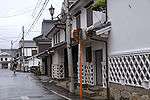Chikugo-Yoshii Station
Chikugo-Yoshii Station (筑後吉井駅, Chikugo-Yoshii-eki) is a railway station on the Kyūdai Main Line operated by JR Kyūshū, in Ukiha, Fukuoka Prefecture, Japan.[1][2]
Chikugo-Yoshii Station 筑後吉井駅 | |
|---|---|
 Chikugo-Yoshii Station in 2006 | |
| Location | Japan |
| Coordinates | 33°20′28″N 130°45′08″E |
| Operated by | |
| Line(s) | ■ Kyudai Main Line, |
| Distance | 26.4 km from Kurume |
| Platforms | 2 side platforms |
| Tracks | 2 + 2 sidings |
| Construction | |
| Structure type | At grade |
| Disabled access | No - platforms linked by footbridge |
| Other information | |
| Status | Staffed ticket window (outsourced) |
| Website | Official website |
| History | |
| Opened | 24 December 1928 |
| Traffic | |
| Passengers (FY2016) | 549 daily |
| Rank | 233rd (among JR Kyushu stations) |
| Location | |
 Chikugo-Yoshii Station Location within Japan | |
Lines
The station is served by the Kyudai Main Line and is located 26.4 km from the starting point of the line at Kurume.[3] Only local trains on the line stop at the station.
Layout
The station consists of two side platforms serving two tracks at grade. Two sidings branch off track 1. The station is a modern structure but built in a traditional Japanese style with white plaster namako walls to recall the white plaster traditional houses which are a tourist attraction in Yoshii town nearby. The station building houses a waiting room and a ticket window. Access to the opposite side platform is by means of a footbridge.[3][2]
Management of the station has been outsourced to the JR Kyushu Tetsudou Eigyou Co., a wholly owned subsidiary of JR Kyushu specialising in station services. It staffs the ticket counter which is equipped with a POS machine but does not have a Midori no Madoguchi facility.[4][5]
 A view of the station platforms and tracks.
A view of the station platforms and tracks.
History
Japanese Government Railways (JGR) opened Chikugo-Yoshii on 24 December 1928 as the eastern terminus of a track from Kurume during the first phase of the construction of the Kyudai Main Line. Chikugo-Yoshii became a through-station on 11 July 1931 when the track was extended east to Chikugo-Ōishi. With the privatization of Japanese National Railways (JNR), the successor of JGR, on 1 April 1987, JR Kyushu took over control of the station.[6][7]
Passenger statistics
In fiscal 2016, the station was used by an average of 549 passengers daily (boarding passengers only), and it ranked 233ed among the busiest stations of JR Kyushu.[8]
Surrounding area
- Yoshii town traditional houses. A group of traditional buildings built with namako white plaster walls for fire-proofing in a style known as dozo dzukuri. The district is located near the station and has been officially classified as an Important Preservation District for Groups of Traditional Buildings.[9]
 Traditional houses in Yoshii town. The station building is built to resemble them.
Traditional houses in Yoshii town. The station building is built to resemble them.
References
- "JR Kyushu Route Map" (PDF). JR Kyushu. Retrieved 23 February 2018.
- "筑後吉井駅" [Chikugo-Yoshii]. hacchi-no-he.net. Retrieved 8 April 2018.
- Kawashima, Ryōzō (2013). 図説: 日本の鉄道 四国・九州ライン 全線・全駅・全配線・第4巻 福岡エリア [Japan Railways Illustrated. Shikoku and Kyushu. All lines, all stations, all track layouts. Volume 4 Fukuoka Area] (in Japanese). Kodansha. pp. 35, 73. ISBN 9784062951630.
- "福岡支店内各駅" [Stations within the Fukuoka Branch]. JRTE website. Retrieved 8 April 2018.
- "筑後吉井駅" [Chikugo-Yoshii Station Station]. jr-mars.dyndns.org. Retrieved 8 April 2018. See images of tickets sold.
- Ishino, Tetsu; et al., eds. (1998). 停車場変遷大事典 国鉄・JR編 [Station Transition Directory - JNR/JR] (in Japanese). I. Tokyo: JTB Corporation. p. 227. ISBN 4533029809.
- Ishino, Tetsu; et al., eds. (1998). 停車場変遷大事典 国鉄・JR編 [Station Transition Directory - JNR/JR] (in Japanese). II. Tokyo: JTB Corporation. p. 739. ISBN 4533029809.
- "駅別乗車人員上位300駅(平成28年度)" [Passengers embarking by station - Top 300 stations (Fiscal 2016)] (PDF). JR Kyushu. 31 July 2017. Archived from the original (PDF) on 1 August 2017. Retrieved 3 March 2018.
- "White wall "dozo dzukuri" construction style". Kyushu Tourism Promotion Organisation official website. Retrieved 8 April 2018.
| Wikimedia Commons has media related to Chikugo-Yoshii Station. |
External links
- Chikugo-Yoshii (JR Kyushu)(in Japanese)